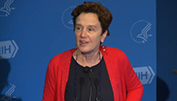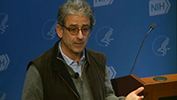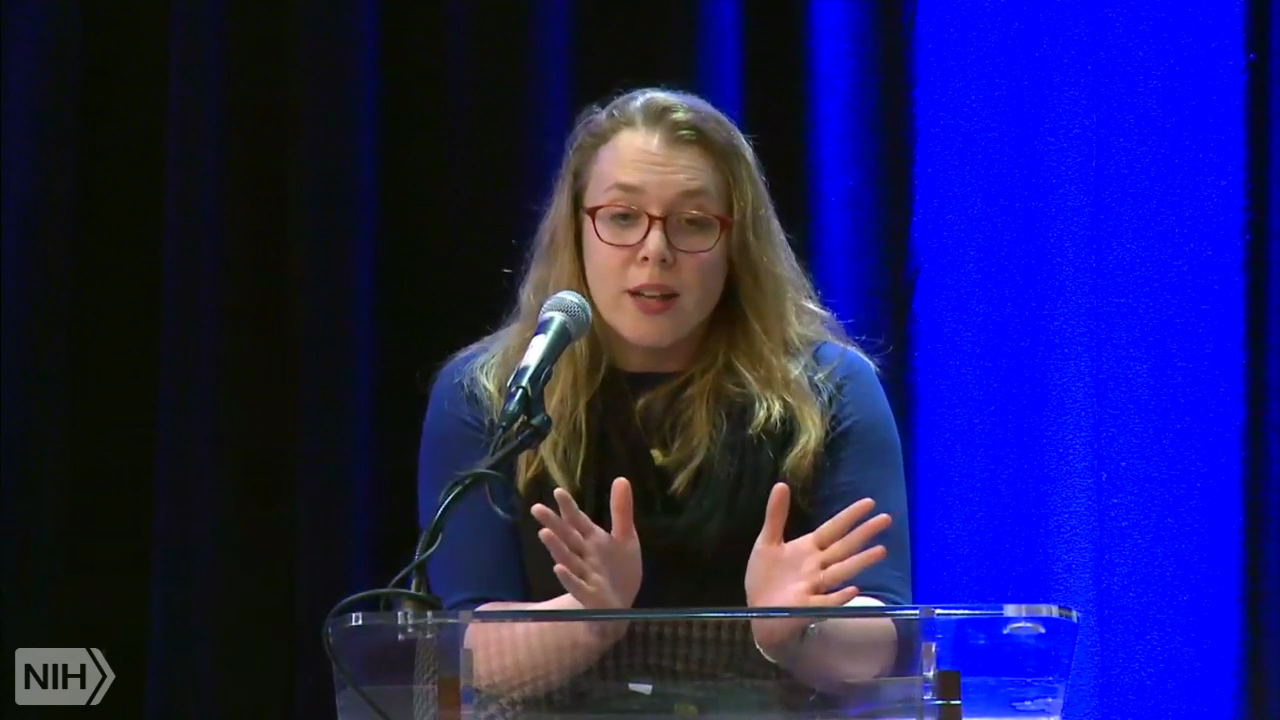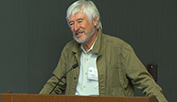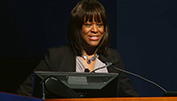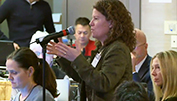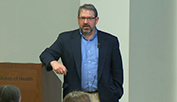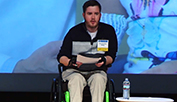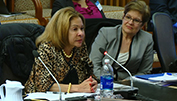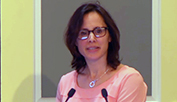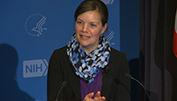-
- NIH VideoCast - CC Grand Rounds: Contemporary Clinical Medicine: Great Teachers: The Changing Face of Informed Consent
-
- - Christine Grady, PhD, MSN, Chief, Department of Bioethics and Head, Section on Human Subjets Research, Clinical Center, NIH (2017/03/14)
- - Category : Clinical Center Grand Rounds
- CC Grand Rounds: Contemporary Clinical Medicine: Great Teachers: The Changing Face of Informed Consent
For more information go to https://cc.nih.gov/about/news/grcurrent.html
NIH VideoCast - CC Grand Rounds: Contemporary Clinical Medicine: Great Teachers: The Changing Face of Informed Consent
-
- NIH VideoCast - High-Throughput Machine Learning from EHR Data
-
- - David Page, PhD, University of Wisconsin-Madison (2017/03/14)
- - Category : Special
- NLM Informatics Lecture
The widespread use of electronic health records and the many recent successes of machine learning raise at least two natural questions. How well can future health events of patients be predicted from EHR data, at various lengths of time in advance? And how can such predictions improve human health? This talk answers the first question via a new approach called "high-throughput machine learning," and it speculates about answers to the second question. In particular, this talk argues that many healthcare applications require not just accurate prediction, but accurate prediction by causally-faithful models. Causal discovery from observational data is already a major research direction in machine learning and statistics, and this talk discusses new approaches across the spectrum from when "we know all the relevant variables" to when "we know only one relevant variable" for the task at hand. If time permits, the talk will also touch on the issue of protecting patient privacy while empowering the construction of accurate predictive models.
David Page is a Vilas Distinguished Achievement Professor at the University of Wisconsin-Madison. His primary appointment is in the Dept. of Biostatistics and Medical Informatics in the School of Medicine and Public Health, with an appointment in the Dept. of Computer Sciences where he teaches machine learning. His PhD in CS is from the University of Illinois at Urbana- Champaign, and he became involved in biomedical applications of machine learning as a post-doc in what was then the Computing Laboratory at Oxford University. He directs the Cancer Informatics Shared Resource of the Carbone Cancer Center and is a member of the Genome Center of Wisconsin. He previously served on the NIH`s BioData Management and Analysis Study Section and the scientific advisory boards for the Wisconsin Genomics Initiative and the Observational Medical Outcomes Partnership, as well as the editorial boards for Machine Learning and Data Mining and Knowledge Discovery. He currently is on the National Library of Medicine Study Section (BLIRC) and directs the EHR project within UW-Madison`s BD2K Center for Predictive Computational Phenotyping.
NIH VideoCast - High-Throughput Machine Learning from EHR Data
-
- NIH VideoCast - Shared Pathways Controlling the Development of Innate and Innate-Like Lymphocytes
-
- - Albert Bendelac, MD, PhD, University of Chicago (2017/03/14)
- - Category : Immunology
- Immunology Interest Group Seminar Series
I will present our current understanding of the PLZF-driven molecular mechanisms underlying the development of Innate and Innate-Like Lymphocytes, highlighting recent findings regarding the upstream events leading to PLZF induction and the downsteeam targets of PLZF. Ultimately, these findings shed light on a fundamental dichotomy between conventional lymphocytes, which acquire effector function after encounter with pathogens, and innate lymphocytes which acquire their effector programs during development.
Dr Bendelac obtained his MD and PhD in Paris, France and joined Ronald Schwartz???s laboratory for postdoctoral research, where he discovered and named NKT cells. He established his independent laboratory at Princeton University in 1994 and moved to the University of Chicago in 2002 to become Chair of the Committee on Immunology.
Dr Bendelac has a longstanding interest in the development and function of innate and innate-like lymphocytes. His early studies identified NKT cells, demonstrated their recognition of CD1d-lipid complexes by semi-invariant TCRs, and characterized the cell biology of lipid antigen capture, processing and loading. The Bendelac group used CD1d tetramers to characterize the different stages and the molecular mechanisms of NKT cell development. These studies led in the identification of their master transcription factor, PLZF. More recently, the critical role of PLZF was extended to innate lymphoid cells (ILC), and PLZF expression was used to define the common ILC precursor in the bone marrow.
NIH VideoCast - Shared Pathways Controlling the Development of Innate and Innate-Like Lymphocytes
-
- NIH VideoCast - Return of Genetic Results in the All Of Us Research Program (Day 2)
-
- - NIH (2017/03/10)
- - Category : Conferences
- All Of Us Research Program
NIH VideoCast - Return of Genetic Results in the All Of Us Research Program (Day 2)
-
- NIH VideoCast - Lasker Lessons in Leadership - Academia and the Private Sector - An Odd Couple?
-
- - Regis Kelly, PhD, O.B.E., Director, California Institute for Quantitative Biosciences (QB3) (2017/03/10)
- - Category : Special
- Lasker Lessons in Leadership is a lecture series aimed at bringing top scientists and medical leaders to the NIH to serve as inspiration for future leadership amongst the MD/PhD and PhD students enrolled in the NIH Oxford-Cambridge Scholars Program and the NIH Lasker Clinical Research Scholars Program. Presented by the Albert and Mary Lasker Foundation, the International Biomedical Research Alliance, and the NIH Oxford-Cambridge Scholars Program.
NIH VideoCast - Lasker Lessons in Leadership - Academia and the Private Sector - An Odd Couple?
-
- NIH VideoCast - Sensors, motion tracking, and data science: the quest to train MD???s like elite athletes
-
- - Carla M. Pugh, M.D., Ph.D., F.A.C.S., Susan Behrens Professor of Surgical Education and Vice-Chair of Education and Patient Safety, Department of Surgery at University of Wisconsin-Madison (2017/03/10)
- - Category : WALS - Wednesday Afternoon Lectures
- NIH Director???s Wednesday Afternoon Lecture Series
The current gold standard for evaluating physician competency for hands-on clinical skills involves the use of observer-based checklists. However, a known weakness in this approach is that certain skills, important to overall performance, cannot be reliably tracked by a human observer. This fault allows the possibility of rating clinicians as competent despite having critical performance deficits. What if sensors and motion tracking could be used to quantify physician performance? This WALS presentation will explore new research demonstrating the relationship between movement metrics, data science, and physician excellence.
For more information go to https://oir.nih.gov/wals
NIH VideoCast - Sensors, motion tracking, and data science: the quest to train MD???s like elite athletes
-
- NIH VideoCast - Return of Genetic Results in the All Of Us Research Program (Day 1)
-
- - NIH (2017/03/09)
- - Category : Conferences
- All Of Us Research Program
NIH VideoCast - Return of Genetic Results in the All Of Us Research Program (Day 1)
-
- NIH VideoCast - Demystifying Medicine 2017: Hepatocellular Cancer and Liver Transplantation
-
- - T. Jake Liang, MD, NIDDK, NIH and Lynt B. Johnson, MD, MBA, Chair, Department of Surgery, MedStar Georgetown University Hospital (2017/03/09)
- - Category : Demystifying Medicine
- The Demystifying Medicine Lecture Series is designed to help bridge the gap between advances in biology and their applications to major human diseases. Each lecture will feature a presentation on a major disease, including current research and advancements on treatments.
For more information go to https://demystifyingmedicine.od.nih.gov
NIH VideoCast - Demystifying Medicine 2017: Hepatocellular Cancer and Liver Transplantation
-
- NIH VideoCast - Robert Wenthold Memorial Lecture 2017: Molecular Mechanisms Regulating Plasticity of Excitatory Synapses
-
- - Katherine Roche, Ph.D., Receptor Biology Section, NINDS, NIH (2017/03/08)
- - Category : Neuroscience
- Robert Wenthold Memorial Lecture - NIH Neuroscience Seminar Series
For more information go to https://neuroscience.nih.gov/neuroseries/Home.aspx
NIH VideoCast - Robert Wenthold Memorial Lecture 2017: Molecular Mechanisms Regulating Plasticity of Excitatory Synapses
-
- NIH VideoCast - Limbic-prefrontal Synchrony in Psychiatric Disease Models
-
- - Joshua Gordon, M.D., Ph.D., Director of NIMH, National Institutes of Health (2017/03/07)
- - Category : Neuroscience
- NIH Neuroscience Series Seminar
Dr. Gordon???s research focuses on the analysis of neural activity in mice carrying mutations of relevance to psychiatric disease. His lab studied genetic models of these diseases from an integrative neuroscience perspective, focused on understanding how a given disease mutation leads to a behavioral phenotype across multiple levels of analysis. To this end, he employs a range of systems neuroscience techniques, including in vivo imaging, anesthetized and awake behavioral recordings, and optogenetics, which is the use of light to control neural activity. His research has direct relevance to schizophrenia, anxiety disorders, and depression.
In addition to his research, Dr. Gordon was an associate director of the Columbia University/New York State Psychiatric Institute Adult Psychiatry Residency Program, where he directed the neuroscience curriculum and administered research training programs for residents. Dr. Gordon also maintained a general psychiatric practice, caring for patients who suffer from the illnesses he studied in his lab at Columbia.
For more information go to https://neuroscience.nih.gov/neuroseries/Home.aspx
NIH VideoCast - Limbic-prefrontal Synchrony in Psychiatric Disease Models
-
- NIH VideoCast - CC Grand Rounds: (1) Activation of TRAIL Receptors to Treat Breast Cancer and (2) Brain Metastasis of Breast Cancer
-
- - (1) Stanley Lipkowitz, MD, PhD, Senior Investigator and Chief, Women???s Malignancies Branch, NCI, NIH and (2) Patricia S. Steeg, PhD Senior Investigator and Deputy Chief, Women???s Malignancies Branch, NCI, NIH (2017/03/03)
- - Category : Clinical Center Grand Rounds
- CC Grand Rounds: (1) Activation of Death Receptors to Treat Breast Cancer and (2) Brain Metastasis of Breast Cancer
For more information go to http://www.cc.nih.gov/about/news/grcurrent.html
NIH VideoCast - CC Grand Rounds: (1) Activation of TRAIL Receptors to Treat Breast Cancer and (2) Brain Metastasis of Breast Cancer
-
- NIH VideoCast - Alzheimer`s and Dementia Resources You Can Use
-
- - Tanya Friese, DNP, RN, Rush University Medical Center, Peter Lichtenberg, PhD, Wayne State University, Lisa McGuire, PhD, CDC, Mark Snowden, MD, MPH, University of Washington and Amy Wiatr-Rodriguez, MSW, ACL (2017/03/03)
- - Category : Special
- Get an update on Alzheimer`s and dementia issues and resources, including:
??? What`s new with consumer, caregiver, and professional resources on dementia, including the 24/7 National Alzheimer???s Call Center, the NIH Alzheimer???s Disease Education and Referral Center, and research participation information
??? Helpful resources on areas of special interest: Veterans and their caregivers, Financial exploitation, and Depression & dementia
??? How the federal government is implementing the National Alzheimer???s Plan, including the overall direction of the plan and its 2017 changes
Presenters:
??? Tanya Friese, DNP, RN, CNL USN (Ret.), Assistant Professor, College of Nursing and Educational Coordinator, Road Home Program, Rush University Medical Center
??? Peter Lichtenberg, PhD, Director, Institute of Gerontology and Professor of Psychology, Wayne State University
??? Lisa McGuire, PhD, Lead, Alzheimer???s Disease and Healthy Aging Program, CDC
??? Mark Snowden, MD, MPH, Associate Professor, Department of Psychiatry and Behavioral Sciences, University of Washington
??? Amy Wiatr-Rodriguez, MSW, Aging Services Program Specialist, ACL
NIH VideoCast - Alzheimer`s and Dementia Resources You Can Use
-
- NIH VideoCast - Genetics and immunology of alopecia areata
-
- - Angela M. Christiano, Ph.D., Richard and Mildred Rhodebeck Professor of Dermatology; Professor of Genetics and Development; Vice Chair for Research in the Department of Dermatology, Columbia University Medical Center (2017/03/03)
- - Category : WALS - Wednesday Afternoon Lectures
- NIH Director???s Wednesday Afternoon Lecture Series
For the past 20 years, Dr. Christiano`s research has focused on understanding the molecular processes that lead to inherited skin and hair disorders in humans. Her research career began with the discovery of genetic mutations associated with epidermolysis bullosa, a skin disease that causes severe blistering. Dr. Christiano`s recent work has focused on the investigation of the underlying genetic causes of and identification of potential therapies for alopecia areata, an autoimmune form of hair loss.
For more information go to https://oir.nih.gov/wals
NIH VideoCast - Genetics and immunology of alopecia areata
-
- NIH VideoCast - Aire: new tricks from an old dog
-
- - Diane Mathis, PhD, Harvard Medical School (2017/03/03)
- - Category : Immunology
- Immunology Interest Group Seminar Series
Aire is a transcriptional regulator that controls immunological tolerance. Its primary modus operandi is the induction ??? specifically in thymic medullary epithelial cells ??? of a battery of transcripts encoding proteins characteristic of terminally differentiated peripheral cell-types, and consequently negative selection of T cells that recognize these proteins. After briefly reviewing the classical findings, this presentation will focus on more recently discovered facets of Aire function, including positive selection of a perinatal population of regulatory T cells, inhibition of the generation of IL-17-producing ???early-responder??? ??:?? T cell populations, and activation of MEC superenhancers.
Dr. Mathis obtained a PhD from the University of Rochester, and performed postdoctoral studies at the Laboratoire de G??n??tique Mol??culaire des Eucaryotes in Strasbourg, France and at Stanford University Medical Center. She returned to Strasbourg at the end of 1983, establishing a laboratory at the LGME [later the Institut de Genetique et de Biologie Moleculare et Cellulaire (IGBMC)] in conjunction with Dr. Christophe Benoist. The lab moved to the Joslin Diabetes Center, Boston in 1999. Through 2008, Dr. Mathis was a Professor of Medicine at Brigham and Women???s Hospital and Harvard Medical School, and Associate Research Director and Head of the Section on Immunology and Immunogenetics at Joslin. Dr. Mathis is currently a Professor in the Department of Microbiology and Immunobiology at HMS, and holder of the Morton Grove-Rasmussen Chair in Immunohematology. She is also an Associate Faculty Member of the Broad Institute. She presently serves on Advisory Boards of the HHMI, Genentech, MedImmune, Pfizer and Amgen (amongst others) and of several research institutes worldwide. Dr. Mathis was elected to the US National Academy of Sciences in 2003, the German Academy in 2007, and the American Academy of Arts and Sciences in 2012. She received the FASEB Excellence in Science Award in 2016. Her lab works in the fields of T cell differentiation, autoimmunity and inflammation. She has trained over 150 students and postdoctoral fellows.
NIH VideoCast - Aire: new tricks from an old dog
-
- NIH VideoCast - Rare Disease Day 2017
-
- - National Center for Advancing Translational Sciences, NIH and the Clinical Center, NIH (2017/03/02)
- - Category : Conferences
- Rare diseases affect an estimated 25 million Americans. Register today to join hundreds of scientists, patients, advocates and many others for Rare Disease Day at NIH to raise awareness about these diseases, the people they affect, and NIH research collaborations that are making a difference.
The day will feature presentations, posters and exhibits, tours of the NIH Clinical Center, and an art show. The event is open to the public, and admission is free. In support of Global Genes??? participation, attendees are encouraged to wear their favorite jeans. Participants can share their thoughts, photos and experiences during the day via social media using the hashtag #RDDNIH.
For more information go to https://ncats.nih.gov/rdd
NIH VideoCast - Rare Disease Day 2017
-
- NIH VideoCast - National Advisory Council on Minority Health and Health Disparities - February 2017
-
- - NIMHD, NIH (2017/03/02)
- - Category : Advisory Board Meetings and Workshops
- 44th Meeting of the National Advisory Council on Minority Health and Health Disparities (NACMHD)
NIH VideoCast - National Advisory Council on Minority Health and Health Disparities - February 2017
-
- NIH VideoCast - Demystifying Medicine 2017: HIV: Frontiers and Vaccine Development
-
- - John Coffin, PhD, NCI, NIH and Jeffrey Lifson, MD, NCI, NIH (2017/03/02)
- - Category : Demystifying Medicine
- The Demystifying Medicine Lecture Series is designed to help bridge the gap between advances in biology and their applications to major human diseases. Each lecture will feature a presentation on a major disease, including current research and advancements on treatments.
For more information go to https://demystifyingmedicine.od.nih.gov/
NIH VideoCast - Demystifying Medicine 2017: HIV: Frontiers and Vaccine Development
-
- NIH VideoCast - Dissection of the neuronal circuits and synapses that mediate the effects of drugs of abuse
-
- - Veronica A. Alvarez, PhD, Senior Investigator, National Institute on Alcohol Abuse and Alcoholism, NIH (2017/02/28)
- - Category : NIH Director`s Seminars
- Director`s Seminar Series
Research in the laboratory headed by Dr. Alvarez is aimed at identifying the neuronal circuits that mediate and regulate reward-motivated and compulsive behaviors. The laboratory has focused on the behaviors toward substance of abuse, such as cocaine and ethanol, in addition to consummatory behaviors towards natural rewards like food and water. Dr. Alvarez pursues an integrative approach that includes the use of electrophysiology, 2-photon laser scanning microscopy and fast-scanning cyclic voltammetry for dopamine detection together with behavioral testing and in vivo manipulation of circuit activity using optogenetic and chemogenetic tools.
NIH VideoCast - Dissection of the neuronal circuits and synapses that mediate the effects of drugs of abuse
-
- NIH VideoCast - The Shocking Abilities of Electric Eels
-
- - Kenneth Catania, Ph.D., Stevenson Professor of Biological Sciences, Department of Biological Sciences, Vanderbilt University (2017/02/28)
- - Category : Neuroscience
- NIH Neuroscience Series Seminar
Dr. Catania???s lab studies animal sensory systems with a focus on brain organization, evolution, and behavior. They investigate sensory specialists because such species reveal general principles of brain function. Recently studied species include star-nosed moles, naked mole-rats, water shrews, and grasshopper mice. They also study the senses and brains of non-mammals including snakes, alligators, and crocodiles.
One line of research is aimed at determining how cortical areas in mammals are organized and adapted to represent and process sensory information. Star-nosed moles are the focus of many investigations because they have an elaborate set of touch receptors (the star) that project information to large brain areas containing anatomically visible sensory maps. This allows studies of brain function that are not possible in other species. They also examine brain organization in a range of animals to determine how brains are organized and (in collaboration with other neuroscientists) how brains evolved. They are also interested in understanding the relationship between different habitats and sensory adaptions.
Dr. Catania???s lab loves a mystery. Unexplained sensory abilities or anatomical structures are fertile ground for new discoveries. Funding from the MacArthur foundation has given them the flexibility to conduct several lines of research into mysterious behaviors or anatomy. Studies of the unusual appendages and predatory abilities of tentacled snakes, the strange behavior of worms in the Apalachicola National Forest, and the ability of some mammals to ???sniff??? while underwater are examples of these studies.
For more information go to https://neuroscience.nih.gov/neuroseries/Home.aspx
NIH VideoCast - The Shocking Abilities of Electric Eels
-
- NIH VideoCast - Linking Data & Research to the Bedside: Perspectives on Patient Acuity and Nursing Staffing
-
- - Caitlin W. Brennan, PhD, APRN, Clinical Center, NIH (2017/02/24)
- - Category : Special
- Washington Regional Nursing Research Consortium (WRNRC) Educaional Offering
Much of the nurse staffing research conducted over the last 20 years focused mainly on large database analyses using hospital-level data, with less of a focus on unit-level context and patient-level demand for care. In this presentation, the participant will hear the story of one researcher`s journey from asking a clinical question at the bedside to conducting outcomes research on patient acuity, nurse assignment decisions, and quality and patient safety in oncology and palliative care populations.
NIH VideoCast - Linking Data & Research to the Bedside: Perspectives on Patient Acuity and Nursing Staffing



